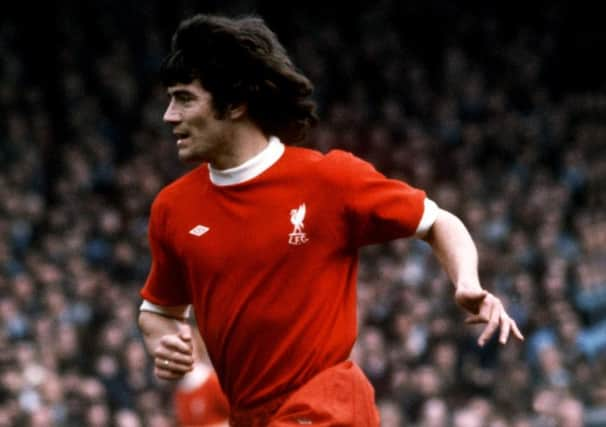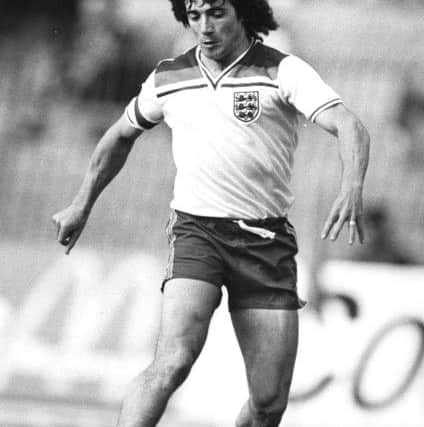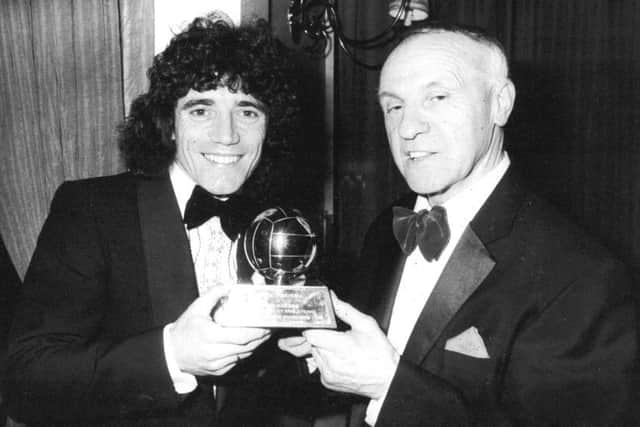Bygones: When Armthorpe's Kevin Keegan transferred to becoming huge star in Germany


Not bad for a Yorkshire lad born in the pit village of Armthorpe, who became the most identifiable and marketable English footballer of the 1970s and came to be idolised by supporters at home and abroad.
That player being the one and only Kevin Keegan, who swapped the Mersey for the Elbe 40 years ago when he moved from Liverpool to Hamburg SV for a eye-watering figure of £500,000, which smashed the British record transfer fee.
Advertisement
Hide AdAdvertisement
Hide AdIt was the first major transfer involving an English player and club and given the career graph of Doncaster-born Keegan, an indefatigable footballer who rung every last drop out of his considerable talent, it should come as no surprise that his time in Germany proved successful and nourishing.


He had to work at; but that was something that Keegan was never shy in doing.
In the summer of 1976, the Liverpool striker had let it be known to Anfield chiefs that the forthcoming season would be his last for the Reds as he sought a new challenge overseas.
Rumours were abound that several continental ‘giants’ were interested. But, in the end, the powerhouses of Spain and Italy stayed away and it was an emerging outfit in Germany who made the decisive move.
Advertisement
Hide AdAdvertisement
Hide AdHamburg was a club swimming in cash thanks to significant investment from Japanese manufacturing kingpins Hitachi – and it was general manager Dr Peter Krohn who was signing the cheques and who dug deep into the club’s coffers to sign Keegan.


Fresh from three consistent campaigns, culminating in a European Cup Winners’ Cup final win over Anderlecht in 1977, Hamburg were emerging from the shadow of Bayern Munich and Keegan’s arrival was the next step in their quest to break the stranglehold of the Bavarians.
Not that landing Keegan was cheap with the striker’s earnings rocketing out of the stratosphere. From earning around £12,000 per year at Liverpool, his wages soared to £250,000 per year with endorsement deals.
But it was a time when money was simply no object for Hamburg.
Advertisement
Hide AdAdvertisement
Hide AdYet it was far from plain-sailing at the start. Hamburg opened the 1977-78 season poorly and matters were compounded when they were crushed 7-1 on aggregate in the European Super Cup by Keegan’s former club Liverpool.


After a 1-1 draw in Germany, Hamburg were thumped 6-0 at Anfield, with Keegan’s long-tiome friend, Terry McDermott, firing a hat-trick with the Kop chants of ‘You should have stayed at Anfield’ suggesting that their former striker’s move was sheer folly.
It was Keegan’s replacement in Kenny Dalglish who applied the salt by firing home the Reds’ sixth goal.
There was also talk that the flash signing of a superstar in Keegan damaged the dressing room equilibrium at Hamburg, a hitherto unshowy side who, as a team, were greater than the sum of their parts.
Advertisement
Hide AdAdvertisement
Hide AdKeegan cashed in on his new-found status and put his name to everything from sportswear and aftershave to computer games and road safety campaigns.


Yet on-pitch results were not forthcoming with Hamburg sitting in 12th place at the season’s half-way point. Slowly but surely, things began to change for the better.
After settling in a farmhouse in the German countryside with his family after spending his early weeks living in a hotel in Hamburg, Keegan began to make his mark on the pitch and earn the respect of his team-mates, whose ranks included the likes of Manfred Kaltz and Felix Magath.
The appointment of 1974 World Cup-winning midfielder Gunter Netzer as general manager also proved a significant moment, too, for Keegan, who came to be awarded the Ballon D’Or after winning over the doubters over time in that 1977-78 campaign.
Advertisement
Hide AdAdvertisement
Hide AdThe Hamburg faithful warmed to the Yorkshireman, christening him Mächtig Maus – ‘Mighty Mouse’ – and after his debut season, Keegan’s fortunes soared further in 1978-79 under the club’s new Yugoslavian team chief Branko Zebec.
Known as a strong disciplinarian, Zebec offloaded any problem influences in the dressing room and introduced strict new training schedules in order to increase fitness.
Crucially, he also paired Keegan with a battering ram of a centre-forward in Horst Hrubesch – in a reprise of Keegan’s successful partnership with another targetman at Anfield in John Toshack.
It proved a golden union with Keegan flourishing with his haul of 11 goals in the final 12 matches helping to bring the Bundesliga title back to Hamburg for the first time since 1963.
Advertisement
Hide AdAdvertisement
Hide AdHamburg, further buoyed by the arrival of ‘Der Kaiser’ Franz Beckenbauer, who headed home after his spell with New York Cosmos, did not lose a match from March 10 to June 9, 1979.
Now the darling of his team-mates, Keegan at the epicentre of it all and securing the European Footballer of the Year award for the second successive year. He even fitted in time to release his first single ‘Head Over Heels in Love’, with Hamburg folk now totally enamoured with their Englishman.
But, in typical Keegan fashion, he was thinking one step ahead.
The 1978-79 season was the last of Keegan’s initial two-year contract and interest arrived from Europe’s elite with Juventus and Barcelona linked. Across the pond, Washington Diplomats were pushing hard for his signature, with a £250,000 deal mooted for a four-month contract in America.
Advertisement
Hide AdAdvertisement
Hide AdBut Keegan did have one unfinished piece of business with Hamburg, namely winning the European Cup and he poured all his energies into trying to achieve that in 1979-80, his third and final season in Germany.
Valur and Dinamo Tbilisi were disposed of in the European Cup before Hamburg were pushed all the way by Yugoslav champions Hadjuk Split before edging through on away goals.
An intriguing sub-plot to the semi-finals saw Keegan line up against compatriot Laurie Cunningham, whose pace and grace was flourishing on the wing at Real Madrid.
The Spanish club appeared to have one foot in the final after winning 2-0 at the Estadio Bernabeu, only for Hamburg to turn in a magical performance in the return to triumph 5-1 on a glory night at Volksparkstadion.
Advertisement
Hide AdAdvertisement
Hide AdBrian Clough’s Nottingham Forest were waiting in the final in Madrid, in what proved to be Keegan’s curtain call – just as the European Cup final for him at Liverpool, three years earlier.
There was no fairytale ending like in Rome 1977 as Forest triumphed before Keegan set sail for home – and Southampton.
Kevin Keegan - Career highlights and stats ...
1951: Born Joseph Kevin Keegan, February 14, Armthorpe, Yorkshire.
1968: Joins Scunthorpe United as an apprentice.
1971: Transferred to Liverpool for £35,000.
1972: Makes England debut against Wales in Cardiff and goes on to help Liverpool win first of three league championships during his time at Anfield.
Advertisement
Hide AdAdvertisement
Hide Ad1973: Keegan wins UEFA Cup winners’ medal as Liverpool overcome Borussia Monchengladbach.
1976: Named footballer of the year and helps Liverpool beat Bruges 4-3 on aggregate to win UEFA Cup again.
1977: A pivotal force in helping Liverpool win the European Cup for the first time by beating Borussia Monchengladbach in Rome, his last game for the Reds. Transferred to Hamburg for £500,000.
1978: Wins Bundesliga championship medal and is voted European player of the year for 1977-78.
1979: Voted European player of the year for 1978-79.
1980: Transferred to Southampton for £420,000.
Advertisement
Hide AdAdvertisement
Hide Ad1982: Last England match as substitute against Spain in Madrid, 1982 World Cup. Won 63 caps, scored 21 goals.
1982: Voted PFA player of the year and transferred to Newcastle for £100,000.
1984: Retired from playing.